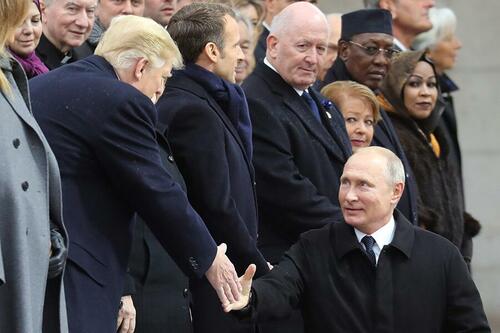The Trump administration is currently formulating a sanctions strategy for Russia which might be better able to foster a peace deal in the Ukraine war.
"Advisers to President-elect Donald Trump are crafting a wide-ranging sanctions strategy to facilitate a Russia-Ukraine diplomatic accord in the coming months while at the same time squeezing Iran and Venezuela, people familiar with the matter said," Bloomberg reports.
Ironically the three countries named happen to be among the world's top oil producers - Russia, Iran, and Venezuela - and Trump's team will want to carefully avoid major supply and price disruptions. Iranian and Venezuelan exports actually increased during the period of the Biden administration, a trend that Trump will try and thwart, given talk of returning to 'maximum pressure' toward political change in these so-called 'rogue' states.

Biden's last Friday move to expand sanctions on Russia's energy sector has without doubt thrown some extra complications into Trump's plans to rapidly negotiate an end to the Ukraine war.
The Bloomberg report indicates two main paths or options Trump's team is mulling: 1) if there are indicators that a truce deal is close, then softening and rolling back restrictions for Russian energy producers could be an extra incentive; or 2) building on existing sanctions could be used as additional leverage to induce Putin to agree to a deal.
But as to this latter option, Putin has not backed down even in the face of ratcheting, historic, and far-reaching punitive economic measures by the West.
Hungary's EU minister Janos Boka seems to have acknowledge these 'options' in Thursday remarks: "I think it is only natural that before we decide on the rollover for another six months, we ask the incoming U.S. administration how they see the future of the sanctions regime," he said in Brussels.
But Washington has hopefully perceived by now that its anti-Russian sanctions have by and large not worked, or backfired. In many ways they have only strengthened Moscow's relations and trade with leading BRICS nations like China and India, as well as Iran.
Despite the prior Trump campaign rhetoric of a speedy negotiation track which will reach a permanent truce soon after he enters office, Trump's team has since acknowledge that talks are likely to take much longer.
A Wednesday Reuters report said, "Advisers to President-elect Donald Trump now concede that the Ukraine war will take months or even longer to resolve, a sharp reality check on his biggest foreign policy promise - to strike a peace deal on his first day in the White House."
"Two Trump associates, who have discussed the war in Ukraine with the president-elect, told Reuters they were looking at a timeline of months to resolve the conflict, describing the Day One promises as a combination of campaign bluster and a lack of appreciation of the intractability of the conflict and the time it takes to staff up a new administration," the report continued.
Both EU and Biden administration officials have long sought to 'Trump-proof' certain pro-Ukraine policies. But this has had the side effect of making the chance for peace in Ukraine much more complex and difficult. Sanctions remain a key part of this complexity.